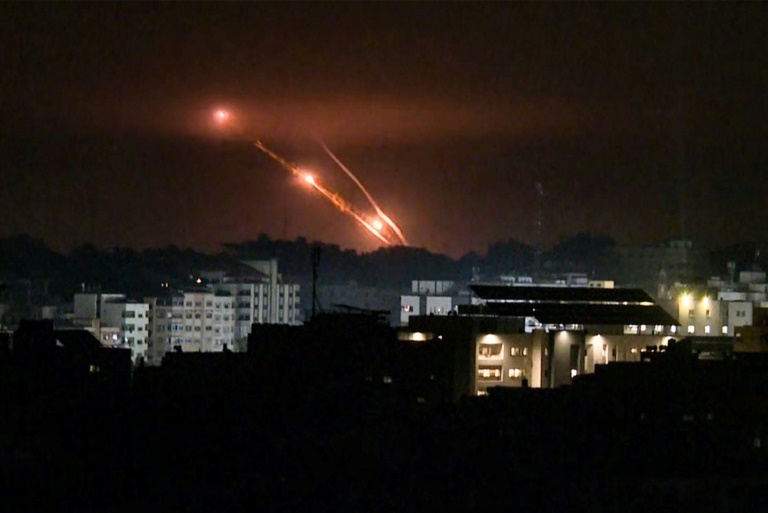Israel’s army relentlessly hammered Gaza on Saturday after a night of fierce bombardment that rescuers said destroyed hundreds of buildings three weeks into a war sparked by the deadliest attack in the country’s history.
Turkey’s Recep Tayyip Erdogan urged Israel to “immediately stop” the attacks, while the families of Israeli hostages held by Hamas demanded a government explanation about their fate amid the army’s intensified air and artillery strikes.
Israel launched its withering bombardment of Gaza after Hamas gunmen stormed across the border on October 7, killing 1,400 people, mostly civilians, and taking nearly 230 others hostage, according to Israeli officials.
The health ministry in the Hamas-run Gaza Strip said Friday that Israeli strikes had killed 7,326 people, more than 3,000 of them children.
The latest Israeli raids were one of the most intense nights of attacks since the war began and coincided with ground operations.
With tens of thousands of troops massed along the Gaza border ahead of an expected full-blown invasion, Israeli forces had also made limited ground incursions on Wednesday and Thursday nights.
“Hundreds of buildings and houses were completely destroyed and thousands of other homes were damaged,” said Gaza Civil Defence spokesman Mahmud Bassal.
The intense bombardment had “changed the landscape” of northern Gaza, he told AFP.
Hundreds of Hamas fighters crossed the Israeli border in vehicles, by air and sea on October 7, indiscriminately killing civilians in the streets, in their homes and at an outdoor rave party.
The unprecedented attack caught Israel off guard and exposed serious intelligence failings.
“The army entered the Gaza Strip and extended its operations” with tanks and artillery, Israeli military spokesman Daniel Hagari said on Saturday.
Israeli fighter jets hit 150 “terror tunnels, underground combat spaces and additional underground infrastructure” and “several Hamas terrorists were killed”, the army said.
The military also published images purporting to show strikes and its tanks manoeuvring within the Gaza Strip.
Hamas’s armed wing, the Ezzedine al-Qassam Brigades, said it was “confronting an Israeli ground incursion” in Beit Hanoun in the northern Gaza Strip and east Bureij in the centre.
Israeli warplanes flew overhead on Saturday and regular concussive booms could be heard coming from Gaza, where many buildings lay in ruins, AFP journalists saw.
A thick haze of smoke covered Gaza and southern Israel after the night of heavy bombardment.
“There are a large number of martyrs and a large number of survivors under the rubble, and we cannot reach them,” a Gaza civil defence official said.
In a bombed-out street in the Tal al-Hawa neighbourhood, 50-year-old Om Walid Basal said her apartment block had been destroyed by Israel.
“This was our house. We lived here just with our children,” she said.
“Why are they bombing us? Why are they destroying our homes?”
The families of Israeli hostages held by Hamas demanded on Saturday an immediate government explanation about their fate after the army intensified strikes on Gaza.
The Hostages and Missing Families Forum, which represents some 229 people believed abducted by Hamas, said the war cabinet failed to explain to relatives whether the ground operation endangered the captives’ well-being.
“The families are worried about the fate of their loved ones and are waiting for an explanation. Every minute feels like eternity,” the group said.
On Thursday, the Ezzedine al-Qassam Brigades said “almost 50” hostages had been killed in Israeli bombing raids since October 7. AFP could not immediately verify the figure.
Hamas said all internet connections and communications across Gaza had been cut, accusing Israel of taking the measure “to perpetrate massacres with bloody retaliatory strikes from the air, land and sea”.
The Palestinian Red Crescent said the communications outage had disrupted ambulance services.
Lynne Hastings, the UN humanitarian coordinator for the Palestinian territories, also stressed on X that “hospitals & humanitarian operations can’t continue without communications”.
“Israel must immediately stop this madness and end its attacks,” Turkish President Erdogan wrote on X, formerly Twitter, on Saturday, after the UN General Assembly called for an “immediate humanitarian truce” in Gaza.
The non-binding resolution on Friday received overwhelming support, with 120 votes in favour, 14 against and 45 abstentions.
It was welcomed by Hamas but harshly criticised by Israel and the United States for failing to mention Hamas, with Israeli ambassador Gilad Erdan calling it an “infamy”.
Israel’s bombardment has displaced more than 1.4 million people inside the crowded territory, according to the UN, even as supplies of food, water and power to Gaza have been almost completely cut off.
Israel has blocked all deliveries of fuel, saying it would be exploited by Hamas to manufacture weapons and explosives.
“Without a fundamental change, the people of Gaza will face an unprecedented avalanche of human suffering,” UN Secretary-General Antonio Guterres warned.
Philippe Lazzarini, head of the UN agency for Palestinian refugees, UNRWA, said Gazans were “not only dying from bombs and strikes, soon many more will die from the consequences of (the) siege”.
A first tranche of aid was allowed in last weekend, but only 74 trucks have crossed since then. The UN says an average of 500 trucks entered Gaza every day before the conflict.
“These few trucks are nothing more than crumbs that will not make a difference,” Lazzarini said.
Israel’s military accused Hamas of using hospitals in Gaza as operations centres for directing attacks, an allegation Hamas denied.
Violence has also risen sharply in the occupied West Bank since the October 7 attacks, with more than 100 Palestinians killed and nearly 2,000 wounded, according to the UN.






